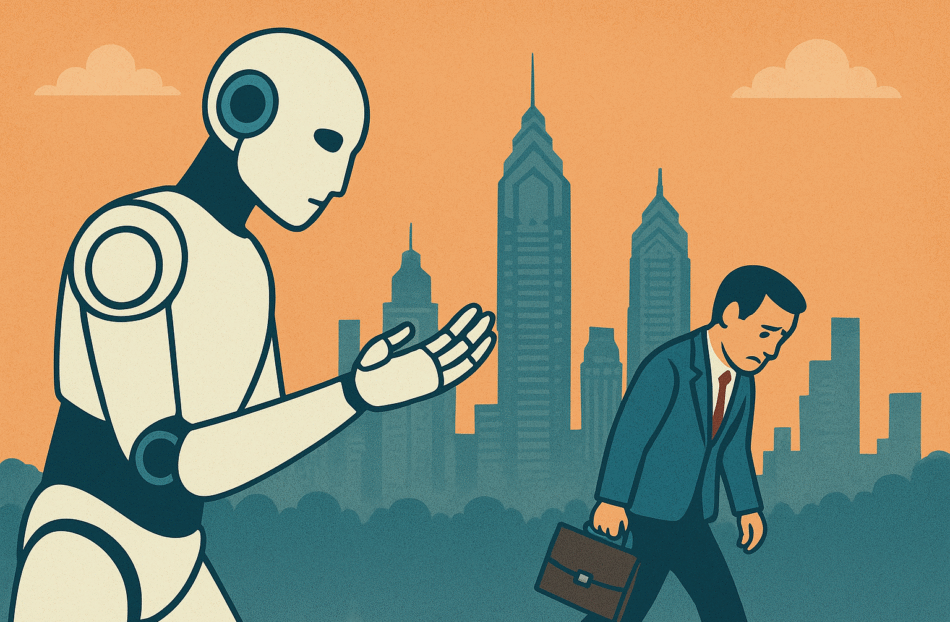
Philadelphia is one of many cities that have seen an increased use in AI technologies leaving residents concerned about its regulations and long-term impacts on the city.
By: Leila Oyeku
Philadelphia, like all major cities in the U.S., is grappling with the ways in which AI is integrating into the infrastructure and social dynamics of the city. From job displacement concerns to law enforcement’s growing reliance on AI tools, recent City Council hearings have highlighted a growing divide over whether the technology’s long-term impact will be transformative progress — or a potential threat to the city’s future.
Devren Washington, who is the Organizing Director of the People’s Tech Project, warns that the increased use of AI in Philadelphia is already cementing injustice within the city.
“There’s a lot of issues with it. There is who owns the data, and what laws govern how the data is collected. AI has been developed to make profit for large corporations and companies and millionaires and billionaires. The products that we see are like surveillance technology. When we’re dealing with a poor city like Philadelphia, it’s money that you’re investing in infrastructure to make an AI that actually just needs to be given back to people through deep investments in their communities,” Washington said.
This June, Amazon announced that it would spend 20 billion dollars on two data centers in Pennsylvania, a move that PA governor Josh Shapiro called the largest capital investment in the state’s history. These data centers will be used to host cloud and computing services for Artificial Intelligence. Shapiro noted Pennsylvania’s energy sources, technology proficient universities, and his administration’s economic strategy, make the state a prime area to partake in these technologies and even outcompete China in AI integration.
Additionally, Philadelphia has already begun to incorporate AI into law enforcement practices. In 2020, the Philadelphia Police Department began experimenting with facial recognition technology run by the controversial company, Clearview AI, which claims to use online images to identify people of interest by matching their photos for law enforcement purposes. Currently, thousands of organizations globally have used this technology including U.S. Immigration and Customs Enforcement (ICE), and the Department of Justice (DOJ).
Yet many studies have shown AI technologies have demonstrated racial biases within its recognition systems, falsely identifying people of color for crimes they did not commit over their white counterparts.
Washington says that this kind of technology poses a risk to Black and Brown communities,
“There’s two issues there. It’s a bad model of governance and a lack of access for communities who may help improve the accuracy of facial recognition. Black and brown people are struggling to get access to tech jobs, and because they’re not in the room, things like facial recognition are not accurate,”
The job market in Philadelphia has also been impacted by businesses and organizations who are increasingly requesting AI skills. Some job seekers are struggling to find employment in the city and suspect that AI will replace human jobs entirely.
Alanna Woods is a learning and development specialist from the Logan area of Philadelphia who has been on the hunt for a new job since 2022.
“A lot of jobs that are hiring are AI related type of companies now, especially if you’re trying to find any work in the tech base. It’s somewhere on the job description as asking about or referring to AI. It’s a little disorienting,” she said.
Reports show that by 2030, approximately 30% of U.S. jobs can be automated and 60% of jobs will be altered by AI tools. Goldman Sachs, an investment banking company, had estimated AI could take over 300 million jobs which will impact 25% of the global labor market. Among those jobs are those involving customer service, content creators, recruitment, and data entry. These jobs have typically relied on human connection, leaving people worried about how this will change the way we interact with each other.
Washington says that the job seeking experience has become a “punitive experience” because of the influx of AI, and the consequences of the current phase of AI implementation will have long-lasting effects.
“We’ll see a reduction in jobs, and a more exploitative experience of the workers where they’re just expected to mimic that of a computer and they’ll lose their job if they don’t. Even just applying for a job. Humans are no longer looking at job applications. That is being handled by AI, and that means that there is less of ability for people to stand out in the same traditional ways” , he said.
For Woods, the idea of shifting towards a less human involved communication process is bizarre.
“It’s strange that its just normalized, especially this past year, the job that I’m currently working in now offers AI interpreting and translation. It’s just a little weird because a lot of times people want, like, a more of a hearing context. People, our whole lives and been complaining about calling and just having to speak automated voices, and now it’s taking a step further to the point where there’s out which any human interaction at all,” Woods said.
Advocates like Washington hope for a future where AI is placed in the hands of the people and hope to see a world in which AI technologies serve as a tool for community empowerment rather than a means of human replacement.
“I hope that within the next few years, we’re able to get our hands around it, and when we do, I think what we can do with it in the community is revolutionize what it means to exist in day to day life. And make it more accessible for everyone to participate,” Washington said.


Be the first to comment